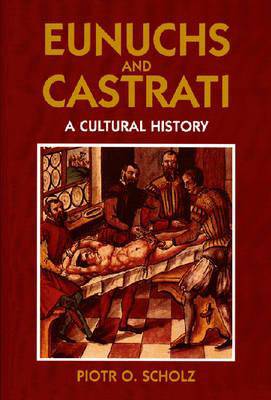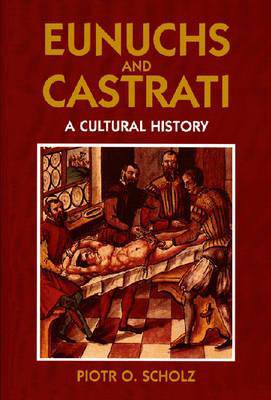
Bedankt voor het vertrouwen het afgelopen jaar! Om jou te bedanken bieden we GRATIS verzending (in België) aan op alles gedurende de hele maand januari.
- Afhalen na 1 uur in een winkel met voorraad
- In januari gratis thuislevering in België
- Ruim aanbod met 7 miljoen producten
Bedankt voor het vertrouwen het afgelopen jaar! Om jou te bedanken bieden we GRATIS verzending (in België) aan op alles gedurende de hele maand januari.
- Afhalen na 1 uur in een winkel met voorraad
- In januari gratis thuislevering in België
- Ruim aanbod met 7 miljoen producten
Zoeken
Omschrijving
This fascinating study of eunuchs guides readers as they travel through various lands and periods, familiarizing themselves with the duties and responsibilities, the unspeakable torments, and the passions and joys of these individuals. Eunuchs were not simply "bedchamber attendants," as the Greek term suggests. Nor were they always slaves. They could just as well be ascetics, priests, magicians, scholars, physicians, military commanders, admirals, or senior officials at the courts of both eastern and western rulers. In the Byzantine empire, the only office they were precluded from attaining was that of emperor. The rich and varied forms of religious, social, and sexual life associated with eunuchs and castrati embrace a wealth of myths relating to gods and demons, initiation rites, rituals, and magic. They touch on the history of law and medicine, various systems of government, and secret societies. And they are presented to us in terms of the cruelest punishments and tortures. On the one hand, they facilitated unique developments in the evolution of vocal music, and on the other, they gave rise to a multiplicity of human behavioral patterns that reflect every aspect of good and evil. Readers will become acquainted with various forms of sexuality, such as androgyny, transvestism, transsexualism, and homosexuality, and learn about the historical, religious, and social issues associated with their characteristic "life settings." Whether out of a sense of shame or because of moral considerations, these phenomena appear only on the margins of the history of customs and mores. The book weaves together art, literary history, theology, anthropology, music, medicine, politics, and law to examine the roles of eunuchs in Egypt, Greece and Rome, Early Christianity, China, Islam, the Middle Ages, the Renaissance and Reformation, and 17th and 18th century Italian opera.
Specificaties
Betrokkenen
- Auteur(s):
- Vertaler(s):
- Uitgeverij:
Inhoud
- Aantal bladzijden:
- 327
- Taal:
- Engels
Eigenschappen
- Productcode (EAN):
- 9781558762015
- Verschijningsdatum:
- 30/07/2014
- Uitvoering:
- Paperback
- Formaat:
- Trade paperback (VS)
- Afmetingen:
- 150 mm x 230 mm
- Gewicht:
- 508 g

Alleen bij Standaard Boekhandel
+ 61 punten op je klantenkaart van Standaard Boekhandel
Beoordelingen
We publiceren alleen reviews die voldoen aan de voorwaarden voor reviews. Bekijk onze voorwaarden voor reviews.









